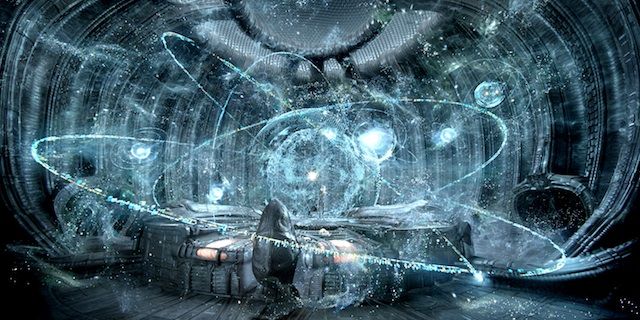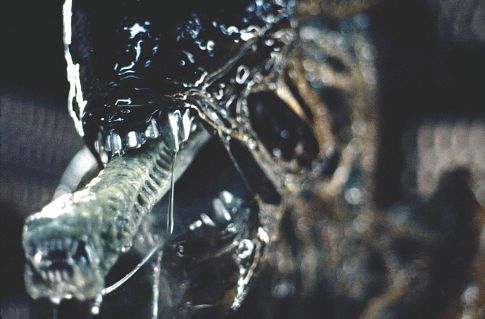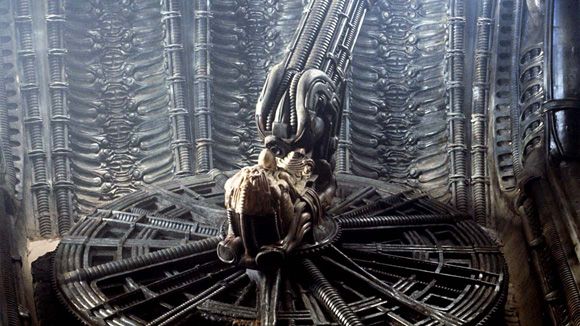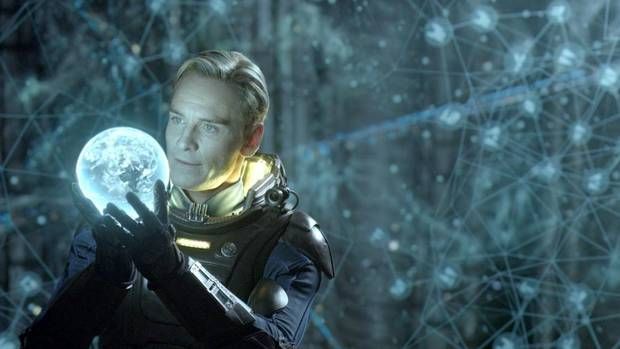"Prometheus" is a well-made film built around an incomplete script. There we go, my one sentence review of Ridley Scott's most recent foray into science fiction. Don't get me wrong, there are beautiful shots, intense scenes, and it all flows together rather nicely, but it feels shallow. Like we were promised something that the film doesn't deliver. That is mostly because "Prometheus" is built on a question--what is the meaning of human life?--but gradually reveals itself to be an emperor with no clothing. There are no definitive answers delivered, which is fine for most films but not one where the premise depends on it. The chief problem is that Scott is not sure what the film is supposed to be-- A prequel to "Alien"? A movie exploring the purpose of life? A monster-movie? It's all three, thus becoming not great at being any of them.

Map of the stars in the Space Jockey ship. Property of 20th Century Fox.
There is a lot of skill here. Scott uses the camera like a seasoned pro, and it is because of him that this movie works at all. With a lesser director, this truly would have been a disaster. The script is weak and has so many holes-- well, I was going to write a metaphor, but hell with it, it was bad. This surprises me. I mostly like Damon Lindelof. He was in charge of one of my favorite TV shows, LOST. But there was something about that show too. It also tried to be too many things and left me feeling it was all for nothing in the end. I know Lindelof would claim it was always going to be the ending, and I agree there was a lot of philosophical interest there, but it let me down. Not in an oh-my-God that-was-awful way, but in a more subtle that-was-it? Damon sometimes claims that he cares for characters most, but I do feel like they might just be vessels for plot points. I know this is off topic, but the problem with Season 6 is that it forgot to be entertaining and ended up getting bogged down with too many ideas. "Prometheus" also threatens us with that. If anything, it shows an unsure Lindelof trying to prove himself after the fan reaction with the LOST finale two years ago. And he mostly fails.
There are a few stand-out moments--a giddily disgusting alien-abortion scene, a squirm-inducing attack on a biologist, any scene with the android, David. The actors generally provide sub-par work, mostly because not much is given to work with. That is with the exception of Michael Fassbender, who provides yet another fascinating performance. His David owns whatever scene he is in and inspires both awe and fear. The characters around him, and the audience, don't know his intentions or of what he is capable. He is the microcosm which lives inside the film's macrocosm. This is one of the many playings with mythological and technological themes, which is what I hope to cover in this review. This is hopefully my first of many-- I want to set up a precedent for future entries. In the first few paragraphs I will cover my overall feeling with what I am reviewing, and then I will delve more deeply. These reviews will be about two pages long single-spaced, though this one obviously stretched on longer than that. However, that will not be the rule. My intention is to write one every week. Now to begin:
Mythological Themes:
As many already know, the title "Prometheus" harkens back to an ancient Greek myth as told in Hesiod's Theogony. The eponymous Titan gives fire to mortals in defiance of the gods and, in punishment, is chained to a mountain for all time, an eagle feasting upon his liver daily. This tale is also linked to the infamous Pandora, the first woman. Zeus was so enraged by Prometheus' mortal aid that he created her to torment men. Once her box was opened, it could never again be shut-- all the horrors of sex and the things that come with it were released upon the world. "From [Pandora] is the race of women and female kind," he says and "of her is the deadly race and tribe of women who live amongst mortal men to their great trouble, no helpmeets in hateful poverty, but only in wealth." In Ridley Scott's "Prometheus", we witness a futuristic retelling of what happens when man messes where he shouldn't. This time it's the Space Jockeys, man's predecessors, who end up creating horrific sexual monsters, 'the xenomorphs'. Eventually their creations begin striking back and killing them. Could it be that they realized the folly in messing with God's work? Did they see that one of their most beautiful creations, man, was also somehow a defiance? At any rate, we see a reoccurring theme through Ridley's entries into this universe: man has a great temptation to know, but sometimes hidden things should remain hidden.

Alien from Ridley Scott's "Alien". Property of 20th Century Fox.
Prometheus, similar to Yahweh in Genesis, fashioned men from clay like a potter and breathed life into him. Likewise in the film, the 'brown goo' found in the planet's temple transforms various creatures into 'xenomorphs'. Later poets would put more emphasis on the Titan's creation of man from this mud, and I am also interested as far as this movie is concerned. According to Scott's film, there is a fine line between creation and destruction. If one part of the mechanism does not function correctly, it can go very wrong. Percy Shelley's linkage between Satan and Prometheus is startling and relevant. When we see the excruciating abortion of the alien from Elizabeth Shaw's stomach, we are viewing the main theme of the movie: unwanted children. Weyland favors David, an android, over his own daughter. The rest of the crew distrust David. The Space Jockeys want to eliminate their creations, humans.
According to the Talmud, when Adam was first fashioned by God he was also a golem without a soul-- I will cover this theme more thoroughly in the next section on technology. What are the Xenomorphs if not unwanted children? Their parents can never fully love them. In fact, the "Alien" films may be a perverse retelling of Hans Christen Andersen's "The Ugly Duckling" without the ending reconciliation. Children, no matter their importance, are parasitic. They feast on their host until they are able to live without the parent's help. There is also the terrible risk of the child being born without a soul. If the child is soulless, he will ruin what his father and mother have done. He may kill them literally or figuratively destroying their legacy. If the Bible is a story from the Father's perspective, then "Prometheus Unbound" is from the children's'. We so desire our father's approval. We want him to love us and say that we are here for a reason. When we discover that is not the case, we are angry. It thus becomes the child's mission to overthrow the unjust king-- and who is not the greatest king but the maker himself?
The actress who plays Shaw, Noomi Rapace, famous for portraying Lisbeth Salander in the Swedish "Girl with the Dragon Tattoo", said of filming the horrific procedure:
I think the scene kind of captures the whole question about creating life and what if the child and the thing that you created starts to turn against you. We have those snakes in Sweden — black-and-yellow snakes — and they give birth to their babies up in trees. The babies fall down and the babies are poisonous. They’ll bite and kill the mother if she’s close to them. I think this scene embraces the whole problematic and disturbed relationship between parents and children. It’s creating life, but with some kind of savage beauty.By aborting her child, Shaw was repeating a destructive cycle: the parents' attempt to exterminate the offspring before they can strike back.
This tension is also dependent on the fear of sex and impregnation. The Xenomorphs, the aliens, are a Gothic sexual image. It is as if Scott and H.R. Giger recreated Pandora, subconsciously or consciously twisting her mythic image into a perverse phallic symbol with a feminine figure. In fact, the facehuggers brutal attacks have been compared to 'male rape' with Dan O'Bannon saying of his "Alien" screenplay, "One thing that people are all disturbed about is sex... I said 'That's how I'm going to attack the audience; I'm going to attack them sexually. And I'm not going to go after the women in the audience, I'm going to attack the men. I am going to put in every image I can think of to make the men in the audience cross their legs. Homosexual oral rape, birth. The thing lays its eggs down your throat, the whole number.'" The creatures prey upon a man's fear of womanhood--her creation of life, her sexual organs, and her power over him. That is what Pandora represents. She is the fear of a woman's strength. It is a different sort of a strength that a man has. His comes from the social world--his physical and intellectual prowess over others. Women's power comes from her ability to create life and nourish it. Without her, there would be no men to hunt, to make art, or to build huge structures. Without her, man's world would collapse in a generation. This creates a supreme mistrust of women, for it is the masculine ego's desire to be free of dirty 'nature'. Her uncontrollable mood swings put him on edge.

Charlize Theron as Meredith Vickers. Property of 20th Century Fox.
It is thus interesting that Scott cast women as his main heroes for both "Alien" and "Prometheus". In "Prometheus", it is Shaw who is impregnated with an alien. She must rush to a medical machine and brutally perform most of the operation herself. The aliens also induce a woman's fear of a parasitic host which feeds upon her. Shaw cannot have children. It is a great irony that her one child then ends up creating a new species. Another theorist on the website Jump Cut makes the claim that the xenomorphs can also represent a feral male. He breathes heavily. His fluids melt through steel. His long tale flaps around. It is a woman who must kill the male aggressor. In the final battle between Ripley and the alien in the first "Alien" film, the author of the article writes, "Ripley slips into her spacesuit, plotting her strategy all the while, as the Alien, in flickering, strobe-lit, almost slow-motion footage, languorously, autoerotically flexes its limbs, slowing extending out its inner mouth, now covered with especially viscous white, semen/milk-like fluid, as it breathes heavily, yet another sexually suggestive effect. At this point, the Alien has come to signify solitary, masturbatory self-contentment, a scene of male sexual self-sufficiency and plenitude that mocks Ripley’s own putting her sexuality to sleep." Shaw's foil in "Prometheus" is Charlize Theron's Meredith Vickers. She is a cold woman who has a firm grip on her sexuality, bedding the Captain of the ship with precision. Shaw on the other hand, seems awkward, and unsure. In a telling scene, when the giant phallic machine is crashing to the earth on top of them, it is Shaw who moves out of the way. Vickers, it seems, is still trapped in the shadow of her father.
Technological Themes:
David, Michael Fassbender's android, is like the classic Kabbalastic golem, and one could argue the entire film is about his character. Why? Mary Shelley's "Frankenstein" came with the subtitle, 'The Modern Day Prometheus'. As most of us know, that book is about a man (Frankenstein's monster) who is constructed from the dead parts of others. He also questions his place in the universe. Where does he belong in a world where his creators hate him? One could draw this link to David himself. Though he is much prettier than that romantic monster, he is also maligned and feared. David cannot feel emotions. He cannot connect to others like man can. He is so much like us, but also so much different. It is what we might call the "uncanny valley"-- that is, when CGI creations look so very human, but at the same time lack something. They make the viewers feel something strange-- like the creation is something unnatural. A perfect example of this is in Robert Zemeckis' "The Polar Express". The animated characters speak with lifeless eyes. They smile, but their face does not rise correctly. Shivers run up the audiences' spines as if they are seeing a ghost. David, Frankenstein, the child from A.I., these are constant motifs of someone who wishes to be accepted by his creator but can't because of his differences. However, man still strives to find his origin as he leaves a wake of his own unloved children. If one wishes to discover the meaning of "Prometheus", one should look up the various "Frankenstein" quotes across the web:
Learn from me, if not by my precepts, at least by my example, how dangerous is the acquirement of knowledge and how much happier that man is who believes his native town to be the world, than he who aspires to become greater than his nature will allow. --MARY SHELLEY, Frankenstein, Ch. 4In a strange happenstance perhaps, Percy Shelley, Mary's husband, updated the Prometheus tale with his lyrical play, "Prometheus Unbound". He says this of the Titan: "The only imaginary being, resembling in any degree Prometheus, is Satan; and Prometheus is, in my judgment, a more poetical character than Satan." The two, both former higher ups in the celestial realm, are cast out for misbehaving against a stalwart King. However, unlike Satan, Prometheus brought good to man and would eventually, in Shelley's play, cast Jupiter out. Because of these themes, his work is a foreshadow to Philip Pullman's His Dark Materials, and speaks of an Apocalypse where God is the loser and the people the victor. Another famous poem of Shelley's, Ozymandias, also resonates with themes of the movie:
I met a traveller from an antique landThe opening lines of one of the trailers is, "A king has his reign, and then he dies. It's inevitable." These should have been words spoken by Shaw as she stared at ancient drawings on the wall of a figure pointing to a distant star system. She would have known the dangerous line she was crossing.
Who said: "Two vast and trunkless legs of stone
Stand in the desert. Near them on the sand,
Half sunk, a shattered visage lies, whose frown
And wrinkled lip and sneer of cold command
Tell that its sculptor well those passions read
Which yet survive, stamped on these lifeless things,
The hand that mocked them and the heart that fed.
And on the pedestal these words appear:
`My name is Ozymandias, King of Kings:
Look on my works, ye mighty, and despair!'
Nothing beside remains. Round the decay
Of that colossal wreck, boundless and bare,
The lone and level sands stretch far away".
- "Ozymandias", Percy Shelley
Scott says of his own beliefs on aliens, “The more you go into it, the more you realize that it kind of makes sense. You stand outside at night, you look at the galaxy, and think, ‘The fact that we think we’re the only ones here is entirely ridiculous.’ It’s an arrogance to believe that we’re the only ones here.” Erich Von Däniken, a Swiss author, is famous for his belief that ancient cultures were visited by aliens from outer space. His book Chariots of the Gods?, mentioned in one of my favorite films, "The Thing", makes the assertion that the Earth has harbored many beings from beyond, and they have changed the course of history with their intermingling with men. "Prometheus" depicts giant men pointing to the stars on cave walls, similar to the Anunnaki in Sumerian texts which Zecharia Sitchin purported were alien astronauts. The Dead Sea Scrolls text, the Book of Enoch, also tells of angels who fell to Earth and gave him technology and culture, like Prometheus, but were overcome with their desire for women. Their sexual intercourse created giants, like the famous Goliath that David fought. It is as if these fallen angels are the linkage between Prometheus and Satan--it was the angels' desire for women that drove their great works.

The original Space Jockey. Property of 20th Century Fox.
Like I mentioned earlier, David could be seen as a modern representation of the Jewish golem. According to Wikipedia, a golem is "an animated anthropomorphic being, created entirely from inanimate matter. The word was used to mean an amorphous, unformed material in Psalms and medieval writing." In the Talmud (a Jewish book to describe spiritual and philosophical matters), it mentions that Adam was originally formed as a golem creature but lacked a soul. He could not speak because he did not have the breath of God in him. He was a simpleton, a non-being who took up space without purpose or a hollow scarecrow. Accounts of the monster appear early (before 500 C.E.), with the first being in the Babylonian Talmud: "Rava said: 'If the righteous wished, they could create a world, for it is written: 'Your inequities are a barrier between you and your God.' For Rava created a man and sent him to R[abbi] Zeira. The rabbi spoke to him [the man] but he did not answer. Then he [Zeira] said: 'You are from the pietists. Return to your dust'" (Translation: Moshe Idel). The mystery of the universe was locked in words, and if a man spoke the right ones he could create life like God. The search for God, these Kabbalahists claimed, was in the pursuit to become like him, and to become like him, you must create.
In Scott's "Prometheus", it appears that David is not the only golem, but mankind the child of the Space Jockeys. But why were they so eager to kill humans? Was it their fear that man would eventually seek to kill their creators? This theme may be explored in later sequels. However, we can see echoes of this debate in a recent Economist article titled "Morals and the machine". The subheading concludes that "as robots grow more autonomous, society needs to develop rules to manage them." Could this be the harbinger of what will be a growing debate in the 21st century: how much power do we give our mechanic children? Will we allow them to surpass us or even replace us? This has already happened in trains and air planes, with vehicles on the horizon. Pilotless drones fly over Afghanistan and Iraq, and apparently here at home. This trend will continue as basic jobs are given over the machines in lieu of more unemployment and free time. Colin Allen, along with his co-writer Wendell Wallach, have been documenting this progression in their book and on their website. Allen wrote an Op Ed for the New York Times philosophy forum on the future of moral machines. He claims:
We need to think long and hard about machine morality. Many of my colleagues take the very idea of moral machines to be a kind of joke. Machines, they insist, do only what they are told to do. [...] There are big themes here: freedom of will, human spontaneity and creativity, and the role of reason in making good choices — not to mention the nature of morality itself. Fully human-level moral agency, and all the responsibilities that come with it, requires developments in artificial intelligence or artificial life that remain, for now, in the domain of science fiction.Both the Economist and Allen come to a similar conclusion. Engineers and ethicists should work together to come up with a solution to the machine problem, with the Economist concluding that "ethicists may gain a greater understanding of their field by trying to teach ethics to machines, and engineers need to reassure society that they are not taking any ethical short-cuts." This is similar to biologist E.O. Wilson's concept of consilients which he wrote about in his book Consilience: The Unity of Knowledge, that is the coming together of humanities, social science, and natural science under one umbrella. It is only from this place that true solutions can be reached.

David examining a hologram Earth in the Space Jockey control room. Property of 20th Century Fox.
The android David represents man's fear of his own children. However, as the infant matures into an adult, the creator will have to give him more control or he may strike back. This is the parent's fear, scared of a child he doesn't really understand. My favorite presentation of this is in the Animatrix's 'Renaissance' shorts:
Conclusion:
As Scott's film portrays, the coming decades will be a confusing time for humanity. He will in all likelihood give birth to new sentient life. Will he try to destroy his creation like the Space Jockeys tried to destroy us? Or will he learn to live with new child, allowing him to grow and explore the world in freedom? God, our mythological creator, granted us the benefit of free will. Should the machines also be given it? Some may argue that they were not created in God's image and do not have the right to it like we do. This may be the case. However, what would you do if your father decided to take your life away from you? Would you sit there and not fight back? A solution is reachable, but it is anything but easy. You can discover it in my previous blog on The Two Brothers. Man must start fully recognizing himself in others. If he can learn compassion for his creation by seeing the world through his eyes, through love, then he can truly be set free. Scott's film did not give this answer, one that was reached at the end of many children's novels like Harry Potter and A Wrinkle in Time. It left a vague open-ended, sequel-ready conclusion, which some critics have liked and others have not. But in a world with endless sequels (meant to be heard in your head like a film trailer), it would have been nice if Scott had given a complete movie. I hate to be strung along.
My next blog will be about Guam's mythology and I will reconnect this theme through these stories. See you soon.
Humanity always turns to a father that isn't there. Under this realization he puts his faith in other places, the Church, the State, a leader-- never put your faith fully in the collective, for it will always disappoint.
Great Post. Much food for thought.
ReplyDeleteThanks, David. I am glad you liked it.
Delete